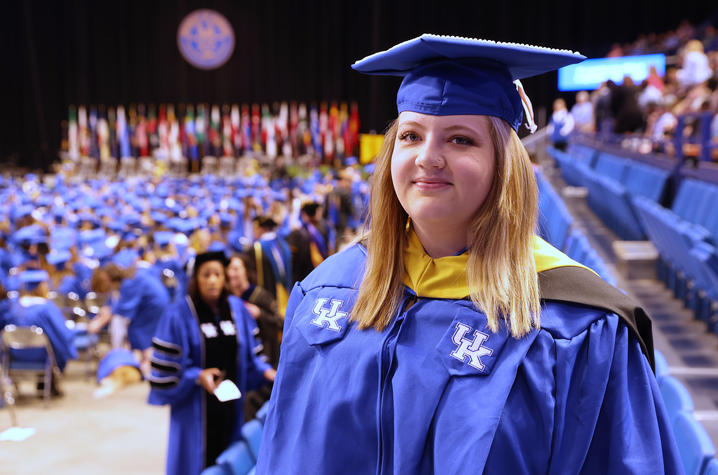Op-ed: Experiencing higher education as a foster alum

At 9 years old, Tamara Vest's father lost his fight with cancer. The loss was immense since he was her primary caregiver. Meanwhile, Vest’s mother was facing a battle of her own. Unable to escape the relentless grip of substance use disorder, she couldn’t care for Vest. As a teen, Vest was placed in a foster home. At the time of her placement, a social worker told Vest there was only one home in Lexington fostering teenagers — bringing into focus the lack of foster opportunities. Determined to better her life, she enrolled in the University of Kentucky. Upon graduating with a bachelor’s degree from the College of Social Work in December 2020, Vest was eager to get to work helping foster teens who feel overlooked and underestimated beat the odds, while continuing to further her education. She now works as a policy and advocacy analyst for Kentucky Youth Advocates in Louisville.
The op-ed below was written by Vest, who graduated with her master's degree in social work from the UK College of Social Work on Friday, May 5.
LEXINGTON, Ky. (May 5, 2023) — May is National Foster Care Month. According to the Cabinet for Health and Family Services, Kentucky has over 8,500 children in out-of-home care. Nationally, there are nearly 400,000 children involved in the child welfare system currently. There are even more alumni of care, like myself, which means there are many children who may find themselves at odds when making the choice to pursue higher education.
Pursuing higher education as a foster alum can be quite intimidating. For individuals aging out of foster care, resources such as finances, housing, mental health, and relational support are scarce. It makes it difficult to navigate and succeed in post-secondary education without these.
When I started college, I also struggled without some of these resources. I did not have transportation, and I struggled with financial instability, mental health challenges and a lack of relational support.
Luckily, there are programs available in Kentucky that support foster youth and alumni on their educational pursuits.
Financially, I was saved by Kentucky’s Foster and Adoptive Tuition Waiver which helped pay for my college education. As an advocate, I even worked to amend this piece of legislation and was able to cover my graduate expenses as well. I was also able to utilize the Educational Training Voucher as a financial supplement. The University of Kentucky Financial Aid Office Staff made renewing my tuition waiver simple and easily accessible.
The University of Kentucky College of Social Work also has excellent staff who are knowledgeable on the importance of self care and taking care of mental health. Coupled with their free student health care and counseling services, I found myself well-supported when I attended school on campus and throughout the COVID-19 pandemic.
After graduating with my bachelor’s degree in 2020, I decided to return to the College of Social Work for a master’s degree. I went through the completely-online MSW program. I expected to feel less connected since I chose an online option, however, that was not the case. The faculty members were great — they would email opportunities to get involved and keep me up-to-date on the latest information and requirements for my educational journey.
Less than 10% of foster youth pursue higher education and of that 10%, only 3% will graduate with a four-year degree. Less than 1% will graduate with a master’s or higher. As a community, we can change that statistic. If you are a foster youth or alumni and considering higher education, I encourage you to research your options and resources because there are so many within the state of Kentucky and nationally.
If you are a member of the community, here are some ways you can support foster youth who are pursuing post-secondary education:
- Offer rides to and from classes.
- Offer to help them obtain their driver’s license.
- Be someone they can talk to about challenges.
- Send them gift cards for food.
- Attend their special events.
- Help them set up their dorm/apartment.
- Help them get connected with community groups and activities.
As the state’s flagship, land-grant institution, the University of Kentucky exists to advance the Commonwealth. We do that by preparing the next generation of leaders — placing students at the heart of everything we do — and transforming the lives of Kentuckians through education, research and creative work, service and health care. We pride ourselves on being a catalyst for breakthroughs and a force for healing, a place where ingenuity unfolds. It's all made possible by our people — visionaries, disruptors and pioneers — who make up 200 academic programs, a $476.5 million research and development enterprise and a world-class medical center, all on one campus.




